
JOURNAL OF INDUSTRIAL MICROBIOLOGY & BIOTECHNOLOGY
Scope & Guideline
Elevating Industrial Practices through Cutting-Edge Biotechnology
Introduction
Aims and Scopes
- Microbial Metabolism and Bioprocessing:
Research exploring the metabolic pathways of microorganisms and their optimization for industrial bioprocesses, including fermentation and bioconversion of substrates. - Synthetic Biology and Genetic Engineering:
Studies involving the engineering of microbial genomes and metabolic pathways to enhance the production of desired compounds such as bioplastics, biofuels, and pharmaceuticals. - Natural Product Discovery:
Investigations into the biosynthesis of natural products from microbes, including antibiotics and other bioactive compounds, focusing on novel strains and genetic pathways. - Bioremediation and Waste Valorization:
Research on utilizing microorganisms for the degradation of pollutants and the conversion of waste materials into valuable products. - Microbial Communities and Systems Biology:
Studies on the interactions within microbial communities and their applications in biomanufacturing and environmental processes.
Trending and Emerging
- Metabolic Engineering and Synthetic Biology:
A significant trend towards the application of synthetic biology and metabolic engineering techniques to improve microbial production systems for various biochemicals, fuels, and materials. - Sustainable Biomanufacturing:
Increased focus on sustainable practices in biomanufacturing, including the use of waste materials and renewable resources, which aligns with global sustainability goals. - Biosensors and Analytical Techniques:
Emerging research on the development of biosensors and advanced analytical techniques for real-time monitoring of microbial processes and product yields in industrial settings. - Climate Change Mitigation:
Research addressing the role of microorganisms in combating climate change, including biotechnological solutions for carbon capture and sustainable agricultural practices. - Microbiome Engineering:
Growing interest in the engineering of microbiomes for enhanced bioprocessing capabilities and improved product synthesis, reflecting a shift towards understanding complex microbial interactions.
Declining or Waning
- Traditional Fermentation Processes:
Research that focuses solely on traditional fermentation techniques without the integration of modern biotechnological advancements appears to be waning as the field moves towards more advanced and engineered approaches. - Single Microbial Strain Studies:
There is a noticeable decrease in studies emphasizing the use of single microbial strains for industrial applications, as the focus shifts towards multi-species systems and synthetic communities. - Basic Microbiological Techniques:
Publications centered around basic microbiological methods and techniques without an applied or industrial context have become less frequent, reflecting a trend towards more application-driven research.
Similar Journals
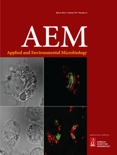
APPLIED AND ENVIRONMENTAL MICROBIOLOGY
Exploring Microbial Innovations for a Sustainable FutureApplied and Environmental Microbiology, published by the American Society for Microbiology, stands as a leading journal in the fields of applied microbiology and environmental science since its inception in 1976. With a prestigious Q1 quartile ranking across multiple categories including Applied Microbiology and Biotechnology, Ecology, and Food Science, this journal consistently disseminates high-impact research that drives innovation and advances our understanding of microbial interactions within our ecosystems and industries. As ranked by Scopus, it exhibits prominent rankings in various related fields, underscoring its critical role in shaping contemporary microbiological research. Researchers, professionals, and students alike can stay abreast of groundbreaking studies while contributing to a vast body of knowledge that spans diverse aspects of microbiology, biotechnology, and ecology, ultimately contributing to sustainable practices. Join the community of dedicated scholars and explore vital research findings that impact both environmental health and technological advancement.
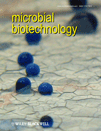
Microbial Biotechnology
Connecting academia and industry through cutting-edge discoveries.Microbial Biotechnology, published by WILEY, stands at the forefront of innovation in the field of applied microbiology and biotechnology, showcasing cutting-edge research and advancements within both academic and industrial contexts. As an Open Access journal since 2012, it ensures that high-quality research is easily accessible to researchers, professionals, and students globally, promoting knowledge sharing and collaboration. With an impressive impact, the journal holds a Q1 ranking in its categories—Applied Microbiology and Biotechnology, Biochemistry, Bioengineering, and Biotechnology—demonstrating its significance in the scientific community. The journal currently boasts a strong Scopus ranking in several relevant disciplines, including a top 10% position in Applied Microbiology and Biotechnology, highlighting its critical role in disseminating influential findings. Designed to foster dialogue and advance technology within the microbial sciences, Microbial Biotechnology is an essential resource for anyone committed to leveraging microbial processes for sustainable and innovative solutions.

Research Journal of Biotechnology
Pioneering research for a sustainable biotechnological future.Research Journal of Biotechnology is a premier publication dedicated to advancing the field of biotechnology through the dissemination of impactful research articles. Published by Research Journal Biotechnology in India, this journal operates under an Open Access model, facilitating unrestricted access to high-quality research for researchers, professionals, and students worldwide. With an ISSN of 2278-4535 and an E-ISSN of 2278-4535, the journal aims to serve as a comprehensive platform for innovative studies in Applied Microbiology and Biotechnology, Bioengineering, and Biotechnology. Despite its current Q4 quartile ranking in these categories, the journal aspires to extend its influence and visibility in the academic community, aiming for greater impact in the future. The journal features research articles that span a wide array of topics in biotechnology, fostering a collaborative and knowledge-rich environment for national and international scholars. We invite you to explore, contribute to, and engage with the expanding landscape of biotechnological research through the Research Journal of Biotechnology.

AMB Express
Unleashing Knowledge for Tomorrow's Biotechnological BreakthroughsAMB Express is an esteemed open-access journal published by Springer, dedicated to the fields of Applied Microbiology and Biotechnology as well as Biophysics. Since its inception in 2011, the journal has played a pivotal role in disseminating cutting-edge research and advancements, particularly for the scientific community in Germany and beyond. With a notable impact factor and ranking in the top quartile of its categories, AMB Express is recognized for its contributions to the disciplines, ranking 29th in Biochemistry, Genetics and Molecular Biology and 37th in Applied Microbiology and Biotechnology, reflecting its commitment to high-quality scientific inquiry. Researchers, professionals, and students will find a wealth of knowledge within its pages, benefiting from a diverse array of articles that stimulate innovation and collaboration. As the journal continues its convergence from 2011 to 2024, it remains a vital source for anybody looking to stay at the forefront of microbiological and biotechnological studies.
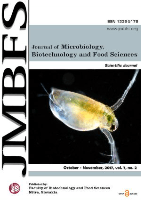
Journal of Microbiology Biotechnology and Food Sciences
Advancing the frontiers of microbiology and food innovation.Journal of Microbiology Biotechnology and Food Sciences, published by SLOVAK UNIV AGRICULTURE NITRA, is a distinguished open-access journal dedicated to advancing scholarship in the interrelated fields of microbiology, biotechnology, and food sciences. With an ISSN of 1338-5178, this journal has been accessible to researchers worldwide since 2011, providing a platform for innovative studies that contribute to the understanding of microbial processes, biotechnological advancements, and food science applications. As reflected in its 2023 category quartiles, the journal holds notable positions in Biotechnology (Q3) and Food Science (Q3), and while it ranks in the lower quartiles for Microbiology (Q4) and Molecular Biology (Q4), it is committed to enhancing its impact within these domains. The journal encourages the submission of high-quality research articles, reviews, and short communications that address critical issues in these fields, making it an essential resource for academics, industry professionals, and students alike. Emphasizing both foundational research and practical applications, the Journal of Microbiology Biotechnology and Food Sciences stands as a vital contributor to the scientific discourse, fostering innovation and collaboration among researchers aiming to solve pressing challenges in food safety, biotechnology development, and microbial studies.
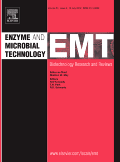
ENZYME AND MICROBIAL TECHNOLOGY
Connecting Researchers to the Future of Microbial TechnologyENZYME AND MICROBIAL TECHNOLOGY, a premier journal published by Elsevier Science Inc, serves as a pivotal platform for researchers and professionals dedicated to exploring the dynamic intersections of microbiology, biochemistry, and bioengineering. With a rich publication history dating back to 1979 and converging until 2024, this journal has established itself within the Q2 quartile rankings across multiple categories, including Applied Microbiology and Biotechnology, Biochemistry, Bioengineering, and Biotechnology, highlighting its influential role in advancing scientific discourse. It holds impressive Scopus rankings, where it is recognized in the 79th percentile for Applied Microbiology and Biotechnology and ranks favorably in related fields, making it a valuable resource for academic and industrial researchers looking to stay abreast of the latest developments. Although it does not currently offer Open Access options, ENZYME AND MICROBIAL TECHNOLOGY remains an essential read for anyone invested in the biotechnological applications of enzymes and microorganisms.
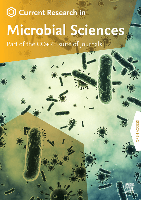
Current Research in Microbial Sciences
Unveiling Insights in Microbiology and Infectious DiseasesCurrent Research in Microbial Sciences is a distinguished peer-reviewed journal published by Elsevier, focusing on the dynamic and rapidly advancing fields of microbiology and infectious diseases. With an ISSN of 2666-5174, this journal has established itself as an essential resource for researchers, professionals, and students alike, offering the latest findings and insights from 2020 to 2024. The journal holds a significant position in the academic landscape, achieving a Q2 ranking across multiple categories, including Immunology and Microbiology, Infectious Diseases, and Medical Microbiology, demonstrating its impact in these critical areas of study. With impressive Scopus rankings—such as being placed in the 94th percentile for Immunology and Microbiology—current research is well-supported by a thriving scientific community. Although the journal is not open access, it serves as a vital platform for disseminating high-quality research and fostering collaboration within the microbial sciences. Engaging with this journal enables professionals and researchers to stay abreast of innovations and contribute to the collective body of knowledge that shapes our understanding of microbial interactions and infectious diseases.
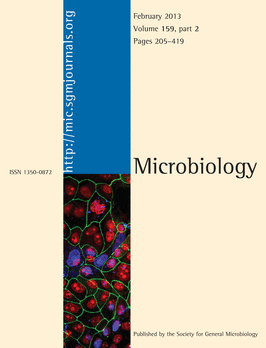
MICROBIOLOGY-SGM
Cultivating a vibrant community of microbiology scholars.MICROBIOLOGY-SGM, published by the esteemed MICROBIOLOGY SOC in the United Kingdom, is a pioneering journal dedicated to advancing the field of microbiology. With its ISSN 1350-0872 and E-ISSN 1465-2080, the journal serves as a vital platform for researchers, professionals, and students to disseminate significant findings and engage in the latest developments in microbiology. Since its inception in 1994, MICROBIOLOGY-SGM has upheld rigorous academic standards, demonstrated by its position in the Q2 quartile of the 2023 Scopus category for Microbiology, ranking #108 out of 182. While traditionally not an open-access journal, it offers a rich selection of articles that address a variety of topics within the microbiological sciences. As we approach 2024, the journal continues to foster collaboration and knowledge exchange, making it an indispensable resource for those at the forefront of microbiological research.

APPLIED MICROBIOLOGY AND BIOTECHNOLOGY
Pioneering research at the intersection of microbiology and innovation.Applied Microbiology and Biotechnology, an esteemed journal published by Springer, serves as a vital resource in the domains of microbiology and biotechnology. With an impressive impact factor reflecting its quality, the journal holds Q1 rankings in various categories including Applied Microbiology and Biotechnology, Biotechnology, and Medicine (Miscellaneous) as of 2023. Spanning the years from 1984 to 2024, it underscores its commitment to disseminating groundbreaking research that addresses pressing challenges in health, agriculture, and environmental sustainability. The journal is rigorously indexed and holds respectable positions in Scopus rankings, notably within the top 15% of Applied Microbiology and Biotechnology and the top 15% in Biochemistry, Genetics, and Molecular Biology. Although it is not Open Access, its comprehensive articles, reviews, and short communications are indispensable for researchers, professionals, and students eager to advance their understanding and application of microbial processes and biotechnological innovations in real-world contexts.

Malaysian Journal of Microbiology
Connecting Research and Practice in Applied MicrobiologyMalaysian Journal of Microbiology is a prestigious open-access journal dedicated to advancing the field of microbiology, published by the Malaysian Society for Microbiology. Since its inception in 2005, this journal has become an essential platform for researchers and practitioners, facilitating the dissemination of innovative studies in applied microbiology, biotechnology, and infectious diseases. Based in Penang, Malaysia, this journal not only focuses on local microbiological research but also positions itself within the broader global scientific community. Although currently placed in the Q4 category in several relevant fields—including Applied Microbiology and Biotechnology, Infectious Diseases, and Medical Microbiology according to the 2023 Scopus rankings—it plays a crucial role in encouraging novel research and fostering collaboration among scientists. The journal encourages submissions that contribute to the understanding of microbial processes, disease mechanisms, and novel biotechnological applications, thereby supporting the continuous growth of knowledge in microbiology. With open access since its launch, the Malaysian Journal of Microbiology ensures that all published works are freely available to the public, enhancing their visibility and impact within the scientific community.